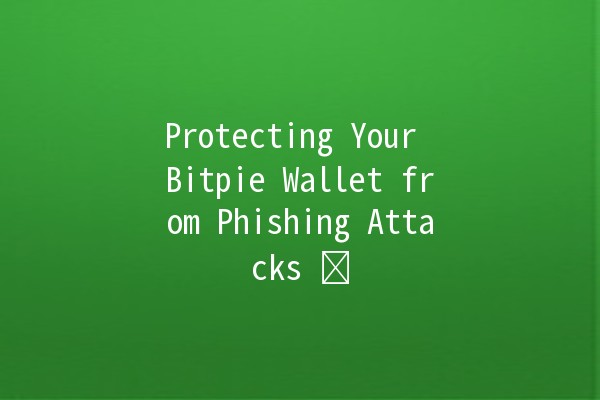
In the rapidly evolving world of cryptocurrency, security is paramount. As more users adopt digital wallets for storing their cryptocurrency assets, the threat of phishing attacks on wallets like Bitpie has become increasingly prevalent. This article explores practical tips and techniques to help you safeguard your Bitpie wallet from these malicious attempts.
Understanding Phishing Attacks

Phishing is a cybercriminal technique that involves tricking individuals into revealing sensitive information, such as passwords or private keys, by masquerading as a trustworthy entity. Phishing attacks can take various forms, including deceptive emails, fake websites, and even social media messages.
To effectively protect yourself, it's essential to recognize the common signs of phishing:
Suspicious Links: Phishing messages often contain links that lead to fake websites designed to mimic legitimate ones.
Urgent Language: Attackers may use urgent language to create a sense of panic, urging you to act quickly without thinking.
Unusual Requests: Be wary of unsolicited emails or messages asking for sensitive information, especially if they claim to be from a trusted source.
By understanding these tactics, you can better prepare for potential threats to your Bitpie wallet.
Five Practical Tips to Enhance Wallet Security
Explanation: TwoFactor Authentication adds an extra layer of security to your Bitpie wallet. By requiring a secondary verification step, it significantly reduces the risk of unauthorized access.
Practical Application: To enable 2FA, navigate to your Bitpie wallet settings. You can opt for an authenticator app (like Google Authenticator) or receive codes via SMS. Once enabled, you'll need to enter a verification code each time you log in, even if someone has your password.
Explanation: Keeping your wallet’s software uptodate ensures you benefit from the latest security patches and features designed to combat emerging threats.
Practical Application: Check for updates to your Bitpie wallet app regularly. Enable automatic updates where possible to ensure you always have the latest security enhancements.
Explanation: Attackers often create fake websites that closely resemble legitimate ones. Before entering your credentials, always doublecheck the website's URL.
Practical Application: When accessing your Bitpie wallet, type the URL directly into your browser instead of clicking on links from emails or messages. Look for “https://” and a padlock symbol in the URL bar to confirm you're on a secure site.
Explanation: Many phishing attempts come in the form of emails that seem legitimate. Developing a critical eye for email communications can save you from falling victim to these scams.
Practical Application: Inspect the sender's email address carefully. Phishing emails often come from addresses that are slightly altered from the official ones. For example, an email from “[email protected]” may be spoofed as “[email protected].” If you're unsure about an email, do not click any links—go directly to the Bitpie website.
Explanation: A strong password is your first line of defense against unauthorized access to your wallet. Unique passwords for different accounts limit the damage if one account is compromised.
Practical Application: Create a password that is at least 12 characters long and includes a mix of uppercase letters, lowercase letters, numbers, and special characters. Consider using a password manager to generate and store unique passwords for your various accounts.
Engaging with the Community
Participating in the cryptocurrency community can help you stay updated on the latest security practices. Forums, social media groups, and official channels often share valuable insights into new scams and how to avoid them.
Common Questions About Protecting Your Bitpie Wallet
What should I do if I suspect my wallet has been compromised?
If you believe your Bitpie wallet has been compromised, act quickly. Change your password immediately and enable 2FA if you haven't already. Additionally, transfer your assets to a new wallet that has not been compromised.
How can I recognize a phishing email?
Look for signs such as mismatched email addresses, grammatical errors, or urgent requests for personal information. Verify the sender's authenticity by checking the email domain against official sources before responding or clicking on any links.
Is it safe to use public WiFi to access my Bitpie wallet?
Avoid accessing your Bitpie wallet or conducting cryptocurrency transactions over public WiFi, as these networks are often less secure. If necessary, use a Virtual Private Network (VPN) to encrypt your connection and add a layer of protection.
Can I use Bitpie on multiple devices?
Yes, but ensure that each device is secure. Use strong passwords and enable 2FA on each device. Also, avoid storing sensitive information in easily accessible places.
What are some signs that I have been a victim of phishing?
Signs may include unauthorized transactions, unexpected account lockouts, or unfamiliar devices accessing your wallet. If you notice these behaviors, investigate further.
How can I learn more about cryptocurrency security?
Follow reputable sources on social media, read articles from cybersecurity experts, and engage in community forums dedicated to cryptocurrency. Staying informed can significantly enhance your ability to protect your assets.
By implementing these strategies and remaining vigilant, you can effectively protect your Bitpie wallet from phishing attacks and secure your cryptocurrency investments. Always prioritize your security and stay informed about the latest trends in cryptocurrency safety.

